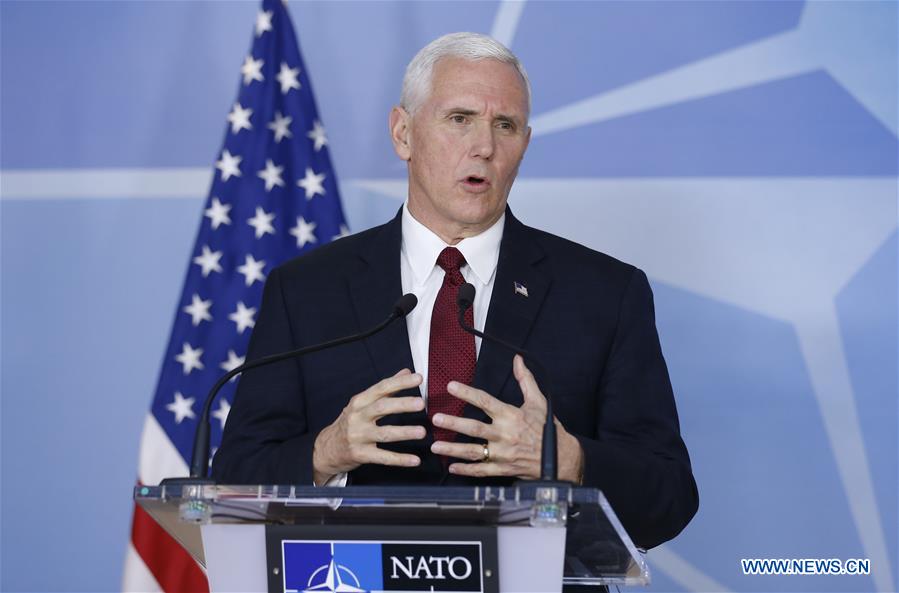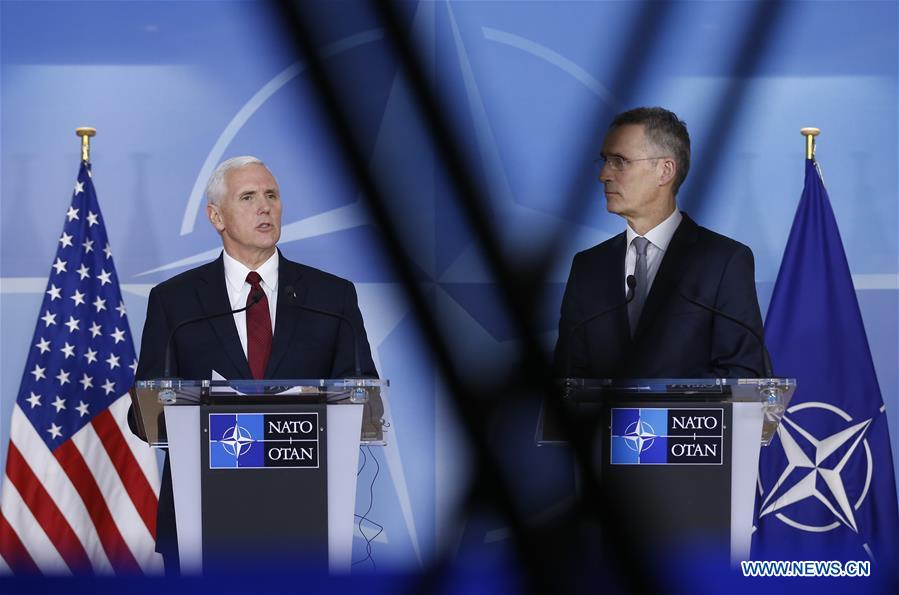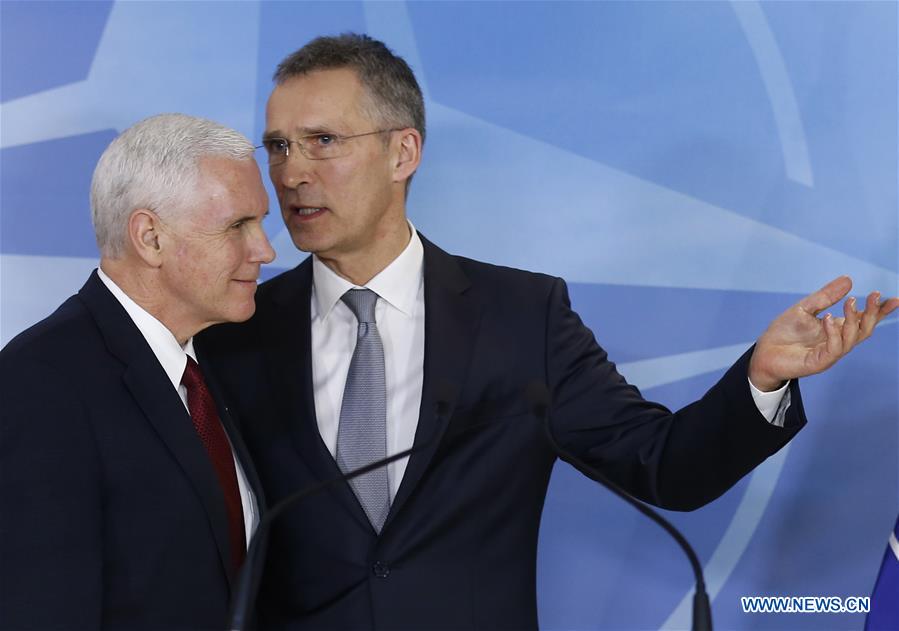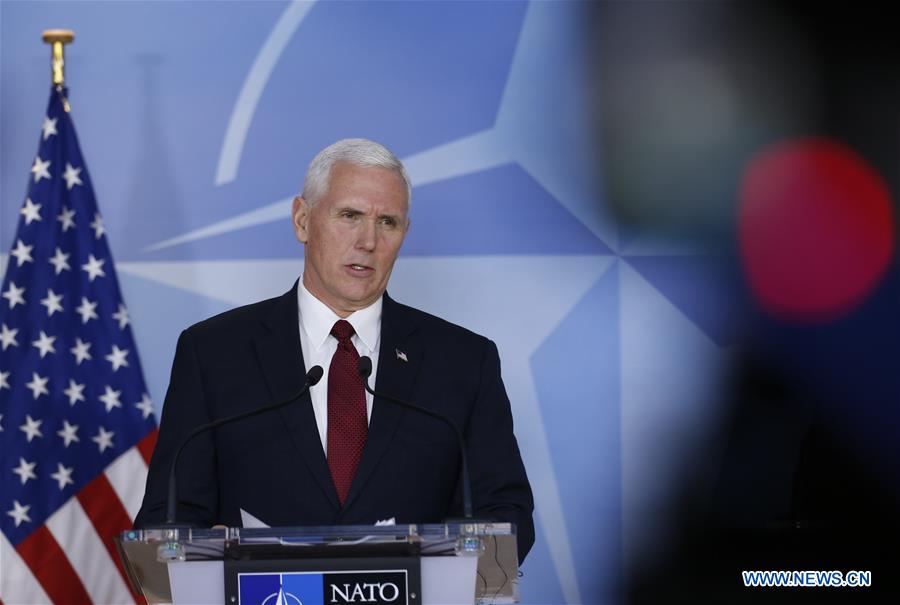
Visiting U.S. Vice President Mike Pence addresses a press conference with NATO Secretary General Jens Stoltenberg (not in the picture) after their meeting at NATO headquarters in Brussels, Belgium, on Feb. 20, 2017. Visiting U.S. Vice President Mike Pence said Monday Europe needed to increase defense spending for the sake of fair burden-sharing among NATO members. (Xinhua/Ye Pingfan)
BRUSSELS, Feb. 20 (Xinhua) -- In his first trip abroad, United States Vice President came to Europe this weekend to talk with European leaders and NATO, with interested parties on both sides of the Atlantic hoping to see growing tensions between the U.S. and Europe soothed.
U.S. President Donald Trump has ruffled feathers in the European Union (EU) both before and after his election, creating concerns on several fronts.
Regarding security, Trump put many Europeans ill-at-ease when he called NATO "obsolete" for having been "designed many, many years ago," for not adequately adapting to the threat of terrorism, and for countries not paying "what they should."
Concerns around Trump's NATO position have only been compounded by what seems to have been a complementary softening of U.S. positions toward Russia. The U.S. president has frequently praised Russian President Vladimir Putin as a "strong leader" and indicated that a better relationship with the Kremlin might be welcome.
American commitment to a unified Europe has been further called into doubt by Trump's repeated statements praising the outcomes of the Brexit vote.
It has also been reported that the U.S. president's top pick for Ambassador to the EU is Ted Malloch, a professor who angered Europe by predicting in January that the single-currency bloc could collapse within 18 months, and saying he would "short the Euro" as an investor.
These issues and more have rattled Europe, with leaders looking for answers about future U.S. policy toward European unity and security. Mike Pence's visit, it appears, has been designed to allay fears.
"Today is my privilege to be on behalf of President (Donald) Trump, to express strong commitment of the United States to continued cooperation and partnership with the EU," the vice president said at a joint press conference with European Council President Donald Tusk after their meeting in Brussels on Monday.
"Whatever our differences, our two continents share the same heritage, the same values and above all, the same purpose to promote peace and prosperity through freedom, democracy and the rule of law," he continued.
The message of direct support for the EU will have been a relief to some European observers, after a Saturday speech at the Munich Security Conference in which Pence managed to avoid any mention of the Union.
It will be difficult for others, however, to ignore signals that U.S.-European relations have been cooling.
European Council President Donald Tusk, who previously described Donald Trump as a potential "threat" to Europe, spoke positively of his meeting with Mike Pence in a statement after the talks, but with a show of reserve.
"Too much has happened over the past months in your country, and in the EU; too many new, and sometimes surprising opinions have been voiced over this time about our relations -- and our common security -- for us to pretend that everything is as it used to be," said Tusk before thanking the American vice president for his frankness and honesty.
"Today I heard words which are promising for the future, words which explain a lot about the approach of the new administration in Washington," the European Council president admitted, before enumerating Pence's confirmation of American commitment to rules-based international governance, shared transatlantic security through NATO, and European unity.
President Tusk, though, made certain to demonstrate that he wanted action that matched Mike Pence's "promising words." "After such a positive declaration, both Europeans and Americans must simply practice what they preach," he said.
European Commission President Jean-Claude Juncker also appeared positive about his meeting with Pence, making it clear in a speech before the talks that he would be seeking to mend relations.
"I do not think that the moment has come to divide the U.S. and the European Union. We are partners for so many decades in the world," Juncker said. "The global stability is heavily depending on the good relations between the United States of America and the European Union."
Similarly, the office of EU foreign affairs chief Federica Mogherini said in a press release that in her meeting with the American vice president, she had discussed the importance of a strong partnership between the EU and the U.S. in an "open and warm conversation."
With all the positive spin on events, it is almost possible to forget that this round of U.S. diplomacy began with American Defence Secretary James Mattis telling fellow NATO allies on Wednesday that they needed to foot more of the security bill, claiming that it was no longer acceptable for American taxpayers to carry a "disproportionate share of the defence of Western values."
He warned that unless fellow members -- of which only five current reach a target 2 percent of GDP (gross domestic product) defence spending, including Estonia, Greece, Poland, Britain and the United States -- moved towards more equal burden-sharing, the U.S. could "moderate its commitment" to NATO.
Mike Pence himself made it clear on Monday at NATO that while U.S. support for the security alliance was "unwavering," equal burden-sharing was necessary.
The question that remains is whether Mike Pence's round of talks in Europe will be enough to calm nerves and return U.S.-EU relations to traditional warmth.
While Mike Pence is certainly addressing some worries, European leaders are likely to remain wary about the future of U.S.-EU relations. Many Europeans will be waiting, like Donald Tusk, to see if American diplomacy will be realized in practice.

NATO Secretary General Jens Stoltenberg (R) and visiting U.S. Vice President Mike Pence attend a press conference after their meeting at NATO headquarters in Brussels, Belgium, on Feb. 20, 2017. Visiting U.S. Vice President Mike Pence said Monday Europe needed to increase defense spending for the sake of fair burden-sharing among NATO members. (Xinhua/Ye Pingfan)

NATO Secretary General Jens Stoltenberg (R) and visiting U.S. Vice President Mike Pence attend a press conference after their meeting at NATO headquarters in Brussels, Belgium, on Feb. 20, 2017. Visiting U.S. Vice President Mike Pence said Monday Europe needed to increase defense spending for the sake of fair burden-sharing among NATO members. (Xinhua/Ye Pingfan)

NATO Secretary General Jens Stoltenberg (R) talks with visiting U.S. Vice President Mike Pence at a press conference after their meeting at NATO headquarters in Brussels, Belgium, on Feb. 20, 2017. Visiting U.S. Vice President Mike Pence said Monday Europe needed to increase defense spending for the sake of fair burden-sharing among NATO members. (Xinhua/Ye Pingfan)

Visiting U.S. Vice President Mike Pence addresses a press conference with NATO Secretary General Jens Stoltenberg (not in the picture) after their meeting at NATO headquarters in Brussels, Belgium, on Feb. 20, 2017. Visiting U.S. Vice President Mike Pence said Monday Europe needed to increase defense spending for the sake of fair burden-sharing among NATO members. (Xinhua/Ye Pingfan)